Kindred Stars and Creators on Modernizing Octavia E. Butler’s Novel
Mallori Johnson stars as Dana James, an aspiring screenwriter who — quite literally — cannot outrun her family trauma. Just don't call the show "sci-fi."
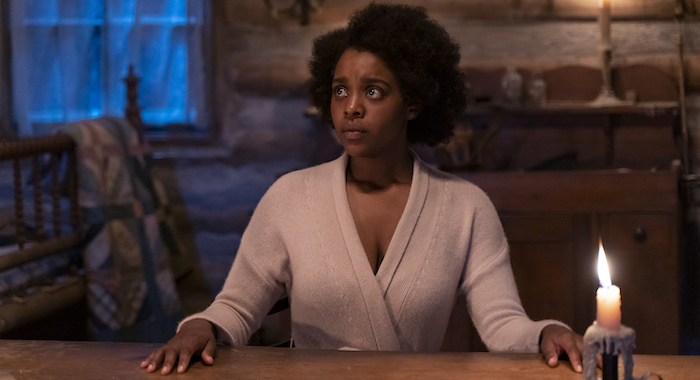
(Photo by Tina Rowden/FX)
There’s been much talk in recent years about generational trauma and how pain inflicted upon our ancestors can still have psychological effects on us. But it’s one thing to study what happened to our foreparents and understand how it reverberates down through our shared DNA. It’s quite another to actually experience it first-hand.
In Kindred, Hulu’s adaptation of the Octavia E. Butler book, that premieres all eight of its episodes on December 13, Mallori Johnson stars as Dana James, an aspiring screenwriter whose keeps getting pulling her back into familial trauma — literally.
Dana’s first night in her home in Los Angeles, she has what she thinks is a dream of waking up in a distant past. Just as suddenly, she finds herself awake in her own, still-empty house after an apparent sleepwalking incident (a parasomnia she’d never previously expressed).
Dana wants to chalk this up as just a fluke experience brought on by a move across country and a new living situation.
But then she’s pulled back again, each time becoming longer and more vivid. She’s able to learn that she’s on an antebellum-era Maryland plantation where some of her ancestors may be enslaved. She also finds a familiar face: Her mother Olivia (Sheria Irving), whom she’d been told died in a car accident.
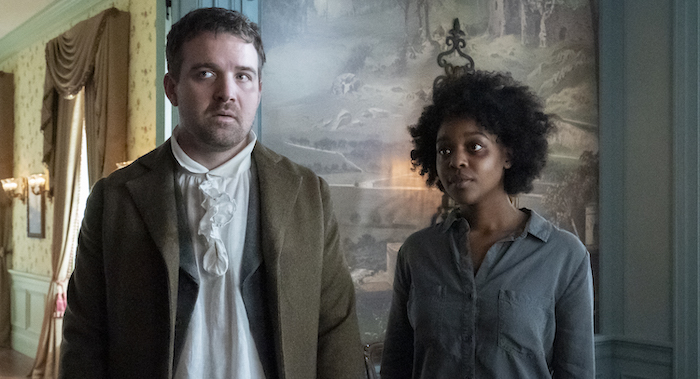
(Photo by Tina Rowden/FX)
All of this sounds nuts. Dana’s sure she’s cracking up and that no one would believe her. But someone does: Micah Stock’s Kevin, the nice waiter from the other night who helps her furnish her new abode and — ahem — christen her bed.
Why does he believer her? Because she accidentally brings him back with her.
Confused and stuck living in a world overseen by drunk, stupid, and abusive plantation owner Thomas Weylin (Ryan Kwanten) and his high-strung, vindictive, and victimized wife Margaret (Gayle Rankin), the duo bear witness to the blatant examples of racism, brutality, and customs that were the bedrocks of our country’s early years and that — while now watered-down — still exist in some form today.
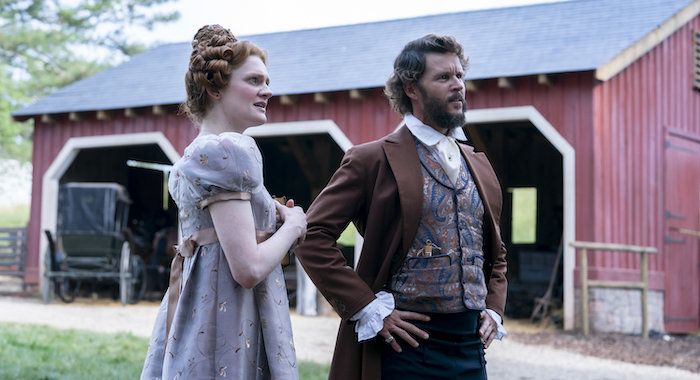
(Photo by Richard Ducree/FX)
Some of the book’s character details have been changed or added and the timeline has been modernized for the TV version. Kindred showrunner Branden Jacobs-Jenkins told Rotten Tomatoes, “I think a lot of people find this book and are shocked to find out that it’s from the ’70s; that it’s almost 45 years old.”
Butler died in 2006. And Jacobs-Jenkins said part of his research included delving into her writing that is archived at The Huntington Library in her hometown of Pasadena, Calif.
“Ironically, in her own life, she said she believed that this is the book she never quite cracked,” he said of the Hugo and Nebula-winning sci-fi author. “I felt like maybe this is an opportunity, as a superfan, to try to help her crack it from beyond the grave.”
He also acknowledged that Butler’s work is having a moment, with TV adaptations of her books Dawn and Fledgling in development for other services. While Jacobs-Jenkins and his writers didn’t have the rights to Butler’s other works and couldn’t directly reference them, he does say there are some Easter eggs left in his series for devotees.
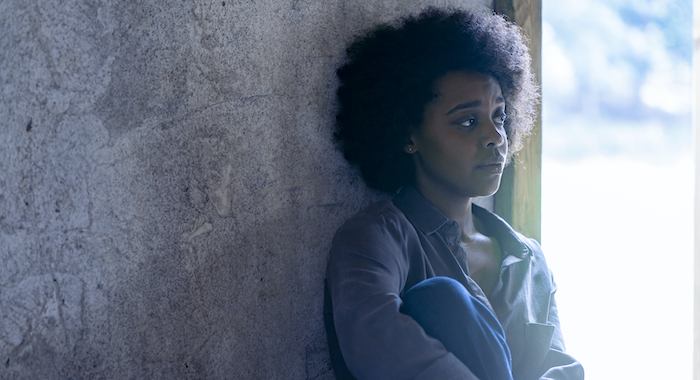
(Photo by Tina Rowden/FX)
Butler’s Dana lived in 1976, a year Jacobs-Jenkins said the author had chosen because that was the country’s bicentennial; it was meant to be what he called a response to “a cultural moment of unification.” In modernizing the story, he moved her to 2016. This was partly because going more recent would mean he’d have to deal with making COVID part of the storyline and because “it seemed like a good piece of symmetry that 2016 was 40 years after the signing of the original book and was such a watershed year in American culture and politics.”
“I think it’s the last year where we can all kind of agree on what was happening,” he said of a time that was only six years ago yet now feels period.
In building out the show’s story bible of how much Dana would know about her family history of time travel, star Johnson said that she felt like “Dana knew [nothing], which helped me in the show. There was this real discordance of how much does Dana know? How is she gonna react at this moment? Why can’t she react to this moment?”
As far as what life was like for a Black person in the 1800s American South, she said, “From what I’ve gathered from the book, and also just from my own understanding of what it means to be a Black woman in America, you can guess the horrors of what goes on as an enslaved person during that time and what the rules might be.”
“I think, for Dana, her real journey in the show is realizing just how awful and terrible the extent to which they experienced such trauma in that time period,” Johnson said.
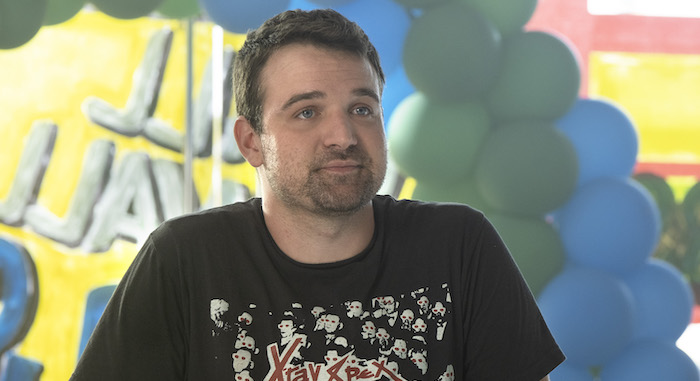
(Photo by Tina Thorpe/FX)
Stock’s Kevin comes to the situation on a different level. A waiter and aspiring musician, Kevin is also white and therefore has the privilege of knowing about our country’s history but not necessarily really processing the details of it. Showing how uncomfortable he is with the accepted violence of this time period could signal to Tom and Margaret that he isn’t like them; thus endangering both him and Dana.
“So much of of their survival relies on these customs,” Stock said. “For Dana, she’s used to being a competent and outspoken person and she’s in an environment where even picking up a book is a life-threatening act. For Kevin, we see that discrepancy because so much of his survival depends on his relationship to these people that he probably doesn’t want to be in a relationship with and the dirtiness that he feels in having to ingratiate himself to stay there.”
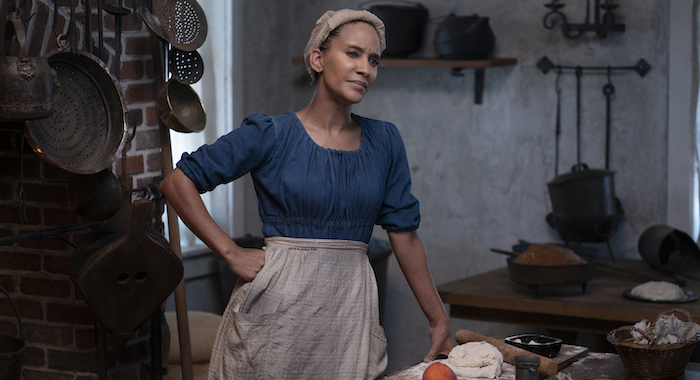
(Photo by Richard Ducree/FX)
Then there are the people who have no other choice but to stay, like Austin Smith’s Luke or Sophina Brown’s Sarah: Humans who are considered property of the Weylins and who are forever fighting for the survival of themselves and their families. The TV series takes a different approach to these characters, especially since the book is told through Dana’s point-of-view.
“In the book, Dana expresses at one point that she looked at Sarah as a ‘mammy’ and Brandon definitely bust that trope wide open,” Brown said.
She stressed that, while “there are a lot of my lines that are directly taken from the pages of the novel,” the series provides space to “really see the exploration of why this woman is … making the decisions that she’s making. What has affected her and what’s led up to the moment that that we see her in?”
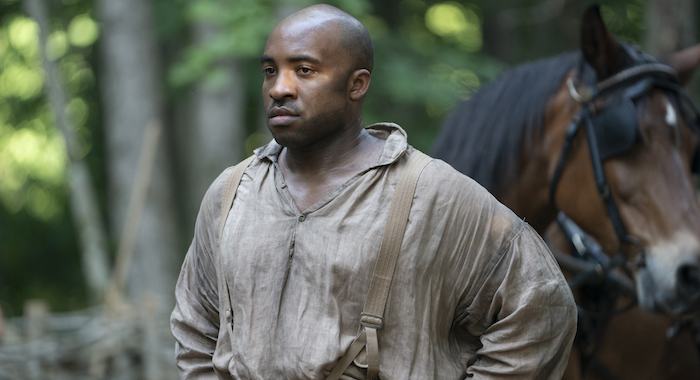
(Photo by Richard Ducree/FX)
In Luke, there is the dichotomy between the way a captured person sees the world versus his captor. Luke and Tom grew up together. Tom might have seen Luke as an ally. But Luke knew better.
“Tom has a more romanticized version of the childhood than Luke does, 1,000 percent,” Kwanten said. “It comes to fruition later in the season when Tom turns his back on the one person that was probably responsible for that plantation turning itself into his success.”
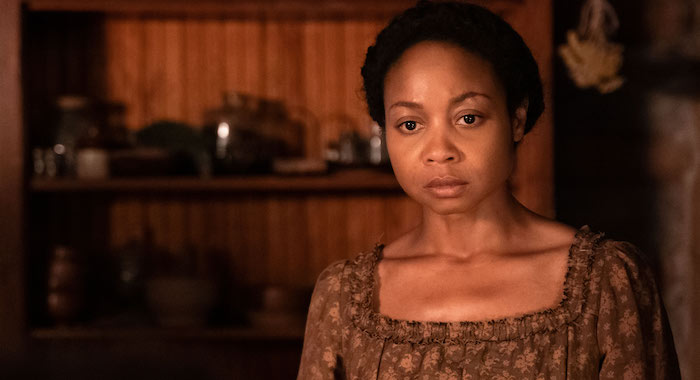
(Photo by Tina Rowden/FX)
Irving had a different challenge of building out her role as Olivia. Dana’s mother is not in the book, but when Dana stumbles upon her in the TV version, Irving said that she’s been “ripped from her former life to this past experience” has has spent a decade navigating her new normal of living as a free Black woman near a plantation.
“She is a fierce, resourceful, woman who knows what she wants,” Irving said of her character. “She’s fighting for her freedom. She’s created her own identity here. And she’s so reserved [and] resourceful … navigating this new land. I don’t think that she exactly knows what to do, or how to get back just yet. It isn’t until she meets Dana that she realizes that she could be a key to both of them returning home.”
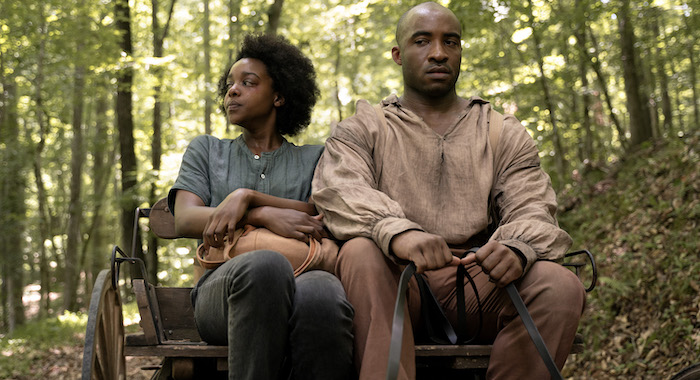
(Photo by Richard Ducree/FX)
Although Butler is normally associated with the science fiction genre and Kindred is her bestselling novel, the author never intended for the latter to be considered part of the former.
“She felt it was a ‘grim fantasy’ — that was the phrase she used — but funnily enough, in TV, when you say ‘fantasy,’ people think Game of Thrones,” Jacobs-Jenkins said. “For me, when I read the book, it feels more like gothic romance. It reminds me of Rebecca [or] Gaslight.”
Jacobs-Jenkins also acknowledged that there’s more to this story that can be told, especially since the final episode has several cliffhangers. Will there be a second season?
“There’s some writers who are doing a little work right now; trying to figure out what a season 2 might look like,” he said. “But we need everybody to watch the show. That’s the surest way to get to that season.”






